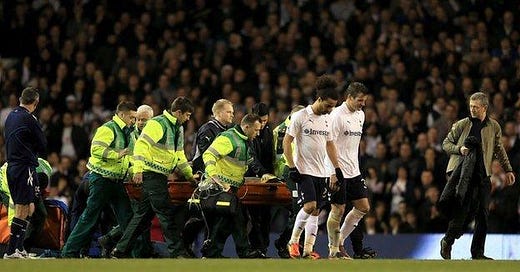A 34 year old man suddenly collapses whilst playing football. He is found unconscious and CPR is commenced. What is the most likely diagnosis?
a) Exacerbation of asthma
b) Pneumothorax
c) HOCM
d) Myocardial Infarction
e) Pneumonia
I remember doing exam questions before my written exams and this type of question always used to pop up. I’d get happy as it was a familiar question with a straightforward answer (C if you’re wondering) but for those who have HOCM, they either find out in terrible circumstances or never find out (as they suddenly die).
HOCM or hypertrophic obstructive cardiomyopathy is a condition which occurs due to thickening of the myocardium. This results in cardiovascular outflow problems as well as conduction abnormalities. Around 50% of cases are inherited and most people are unaffected until they perform high intensity cardiovascular activities. Think congestive heart failure - shortness of breath, syncope, leg swelling but over seconds. It can also result in terrible arrhythmias such as VF as well as causing a stroke.
Those videos you see of athletes collapsing on the pitch are due to HOCM. I went to school with Bolton FC football player Fabrice Muamba who in 2012, collapsed on the pitch and received repeated cycles of CPR and shocks. Here is a really gripping article describing the events.
A condition like this can either be fatal or career ending and so far treatment has been limited. Options have included medications including beta blockers and ACEi as well as novel procedures such as surgical septal myomectomy which has limited effect in such patients.
Things may change now as NICE has just sanctioned the use of mavacamten, the first medication that has been used to reduce the chances of adverse complications of HOCM. Mavacamten is a selective and reversible inhibitor of the cardiac myosin ATPase. In patients with HOCM, the cardiac myocytes are found to be tense due to hypercontractability and impaired relaxation. This in-turn impairs overall cardiac contractility and results in reflex hypertrophy which further impairs cardiac contractility as per Starling’s law.
Mavacamten inhibits cardiac myosin. This reduces the number of myosin-actin cross-bridges and decreases contractility. Functional studies have shown this to lessen excessive cardiac contractility and increased diastolic compliance.
Having known someone who personally suffered with HOCM, this medication could be a game changer. Let’s see how things play out.
Until next time..
Please like & share:
Check us out on our various pages
Website: www.paretoeducation.co.uk
Instagram: www.instagram.com/pareto_ed
Twitter: www.twitter.com/pareto_ed
Youtube: https://bit.ly/3DPm23c
Email: paretopaeducation@gmail.com




